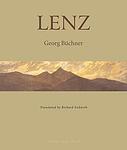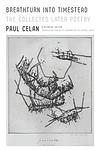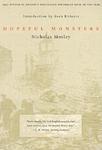The Greatest "Germany, Experimental" Books of All Time
Click to learn how this list is calculated.
This list represents a comprehensive and trusted collection of the greatest books. Developed through a specialized algorithm, it brings together 300 'best of' book lists to form a definitive guide to the world's most acclaimed books. For those interested in how these books are chosen, additional details can be found on the rankings page.
Genres
The category of "Germany" in terms of books would encompass literature that is set in or about Germany, its history, culture, people, and society. This could include works of fiction, non-fiction, memoirs, biographies, and historical accounts that explore various aspects of German life, such as the country's politics, economy, art, music, literature, and more. The category would be of interest to readers who are fascinated by Germany's rich and complex history, its contributions to world culture, and its ongoing role in shaping global affairs.
The "Experimental" category of books is characterized by works that challenge traditional literary conventions and push the boundaries of form and content. These books often incorporate unconventional narrative structures, language, and themes, and may experiment with different mediums such as poetry, visual art, or multimedia. The goal of experimental literature is to create new and innovative ways of storytelling that challenge readers' expectations and expand the possibilities of what literature can be.
Countries
Date Range
Reading Statistics
Click the button below to see how many of these books you've read!
Download
If you're interested in downloading this list as a CSV file for use in a spreadsheet application, you can easily do so by clicking the button below. Please note that to ensure a manageable file size and faster download, the CSV will include details for only the first 500 books.
Download-
1. Gravity's Rainbow by Thomas Pynchon
Set during the end of World War II, the novel follows Tyrone Slothrop, a lieutenant in the U.S. Army, as he tries to uncover the truth behind a mysterious device, the "Schwarzgerät", that the Germans are using in their V-2 rockets. The narrative is complex and multi-layered, filled with a vast array of characters and subplots, all connected by various themes such as paranoia, technology, and the destructive nature of war. The book is known for its encyclopedic nature and its challenging, postmodernist style.
-
2. Thus Spake Zarathustra by Friedrich Nietzsche
This philosophical novel explores the idea of the Übermensch, or "Overman," a superior human being who has achieved self-mastery and created personal meaning in life. The protagonist, Zarathustra, descends from his solitary life in the mountains to share his wisdom with humanity. Through a series of speeches and encounters, he challenges traditional beliefs about good, evil, truth, and religion, and advocates for the transcendence of man into a higher form of existence. The book is noted for its critique of morality, its poetic and often cryptic language, and its exploration of complex philosophical concepts.
-
3. Berlin Alexanderplatz by Alfred Döblin
Set in 1920s Berlin, the book follows the life of Franz Biberkopf, a man recently released from prison who is trying to make an honest life for himself. However, he is drawn back into the criminal underworld due to circumstances and the influence of his acquaintance, Reinhold. The book is a vivid portrayal of city life in Weimar-era Germany, exploring themes of poverty, crime, redemption and the struggle to maintain one's morality amidst chaos and corruption.
-
4. The Gift by Vladimir Nabokov
"The Gift" is a novel that tells the story of Fyodor, a Russian émigré living in Berlin, who is struggling to establish himself as a writer. The book explores his life, love, and the process of writing, along with his relationships with his fellow Russian émigrés. The narrative also delves into Fyodor's admiration for his father, a renowned explorer who mysteriously disappeared on an expedition. The novel is a profound examination of the creative process, the expatriate experience, and the power of art.
-
5. Vertigo by W. G. Sebald
"Vertigo" is a complex narrative that combines elements of fiction, travelogue, biography, and autobiography. The novel is divided into four sections, each exploring the life and works of different historical figures such as Stendhal, Kafka, and Casanova, as well as the author's own experiences. The narrative is characterized by its exploration of themes such as memory, identity, and the past, often blurring the lines between fact and fiction. The book is also notable for its distinctive style, featuring long, meandering sentences and a lack of traditional plot structure.
-
6. Life is a Carawanserai Has Two Doors I Went in One I Came out the Other by Emine Sevgi Özdamar
This novel follows the life of a young Turkish girl growing up in the 1950s and 60s, exploring her experiences in a rapidly changing society. The protagonist navigates the complexities of her family life, her struggle with her identity and her eventual emigration to Germany. The book explores themes of female empowerment, cultural clashes, and the immigrant experience, all told through a unique narrative style that blends reality with dreams and folktales.
-
7. Lenz by Georg Buchner
"Lenz" is a novella that explores the mind of Jakob Michael Reinhold Lenz, a historical figure and playwright, during his descent into madness. The narrative presents a detailed account of Lenz's mental state as he struggles with depression, anxiety, and hallucinations while living in the mountains. It provides a profound look into the human psyche and the effects of isolation and mental illness.
-
8. The Museum of Unconditional Surrender by Dubravka Ugrešić
"The Museum of Unconditional Surrender" is a poignant and surreal narrative that explores the dislocation and fragmentation experienced by an unnamed narrator who has been exiled from her homeland, former Yugoslavia. The novel is presented as a collection of fragments, including letters, diary entries, and observations, which together portray a deep longing for a lost homeland and an exploration of memory, identity, and the power of art. The story is centered around a photograph of a walrus in a Berlin zoo, which serves as a metaphor for the narrator's own feelings of displacement and alienation.
-
9. Dada Documents And Manifestoes by Robert Motherwell
"Dada Documents and Manifestoes" is a compilation that offers a comprehensive insight into the Dada movement, a pivotal early 20th-century cultural phenomenon that challenged traditional art forms and cultural norms. The book brings together essential manifestoes, writings, and documents from various Dada artists and thinkers, providing readers with a vivid portrayal of the movement's radical ideas and experimental approaches. Through these texts, the collection not only explores Dada's artistic and literary innovations but also delves into its profound influence on modern art and its critique of contemporary society, politics, and culture.
-
10. Memory Rose Into Threshold Speech: The Collected Earlier Poetry by Paul Celan
"Memory Rose Into Threshold Speech: The Collected Earlier Poetry" is a compilation of the early poetry works of Paul Celan. The book delves into themes of memory, language, and the human experience, showcasing Celan's unique style and exploration of complex emotions. Through his powerful and evocative language, Celan invites readers to reflect on the profound impact of memory and the transformative power of words.
-
11. Hopeful Monsters by Nicholas Mosley
"Hopeful Monsters" is a novel that explores the lives of two intellectuals, a German physicist and a British anthropologist, against the backdrop of the political and scientific upheavals of the 20th century. Their personal journeys and love story are intertwined with their pursuit of understanding in the realms of physics, biology, and anthropology, as they grapple with issues such as quantum mechanics, genetics, and the nature of consciousness. The narrative also delves into the moral and ethical challenges posed by the rise of fascism and the advent of the atomic bomb.
Reading Statistics
Click the button below to see how many of these books you've read!
Download
If you're interested in downloading this list as a CSV file for use in a spreadsheet application, you can easily do so by clicking the button below. Please note that to ensure a manageable file size and faster download, the CSV will include details for only the first 500 books.
Download








